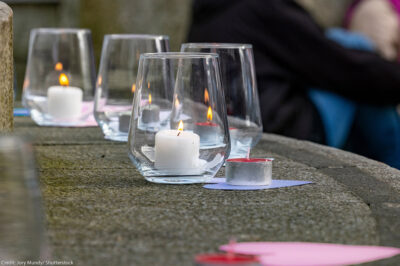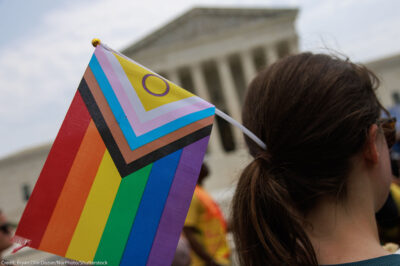I know that I am one of the luckiest lawyers in the world because I work at an amazing organization and represent truly exceptional clients. But some days are truly special, and make you feel proud to be a lawyer.
I'm talking about those days when you see the legal system work the way you always wanted to believe that it should work. Vindicating the rights of someone who has been wronged. Striking a blow for fairness and justice. Yesterday was one of those days.
At 5:30 in the afternoon, a little blip came across my Blackberry, telling me that we had gotten a decision in the remedy phase of our case on behalf of Diane Schroer. Last September, after a week-long trial, a federal district court ruled that the Library of Congress had engaged in illegal sex discrimination when it rescinded its job offer to Diane after she informed her future boss that she was transitioning from male to female and wanted to start work as Diane, and not David. Having found that the Library broke the law, the Court's next task was to decide what relief would best reflect the harm that Diane has suffered.
As I learned in the course of putting our remedy-phase papers together, it's not easy to put into words just how painful it is to experience discrimination. Yet, from what I've witnessed in talking to scores of LGBT people across the country, being denied opportunity simply because of who you are can crush one's soul. It can cause you to lose hope, and to give up on others, and in the saddest cases, to give up on yourself.
Diane, as many of you know, is no ordinary woman. After 25 years of serving in some of the most prestigious and sensitive missions in the military, Diane is someone who can handle stress. But even she is human, and, as I have witnessed firsthand, even she can have her heart broken. And as I tried to help Diane explain in her declaration to the Court how the Library's actions had affected her life, it became clear to me that the Library's actions in December 2004 had broken her heart. Her government, which she served with devotion and without question for her entire adult life, had betrayed her and turned its back on all of the values for which Diane had risked her life. She had been the best person for the job, and yet she was denied the chance to serve her country simply because she is a transgender woman.
The ruling from the Court yesterday is important not only because it granted Diane the maximum relief to which she was entitled under the law ($300,000 in pain and suffering damages, plus another $190,000 in lost wages), but also because the decision explains in clear and powerful language why discrimination hurts. It hurts those people who are the victims of discrimination, and it hurts the rest of us because discrimination causes brave, valiant and talented people like Diane to question whether they will be "allowed" to share their talents and live without fear of discrimination (or worse). I am very proud to be a lawyer today. And I am very honored to be Diane's lawyer.




